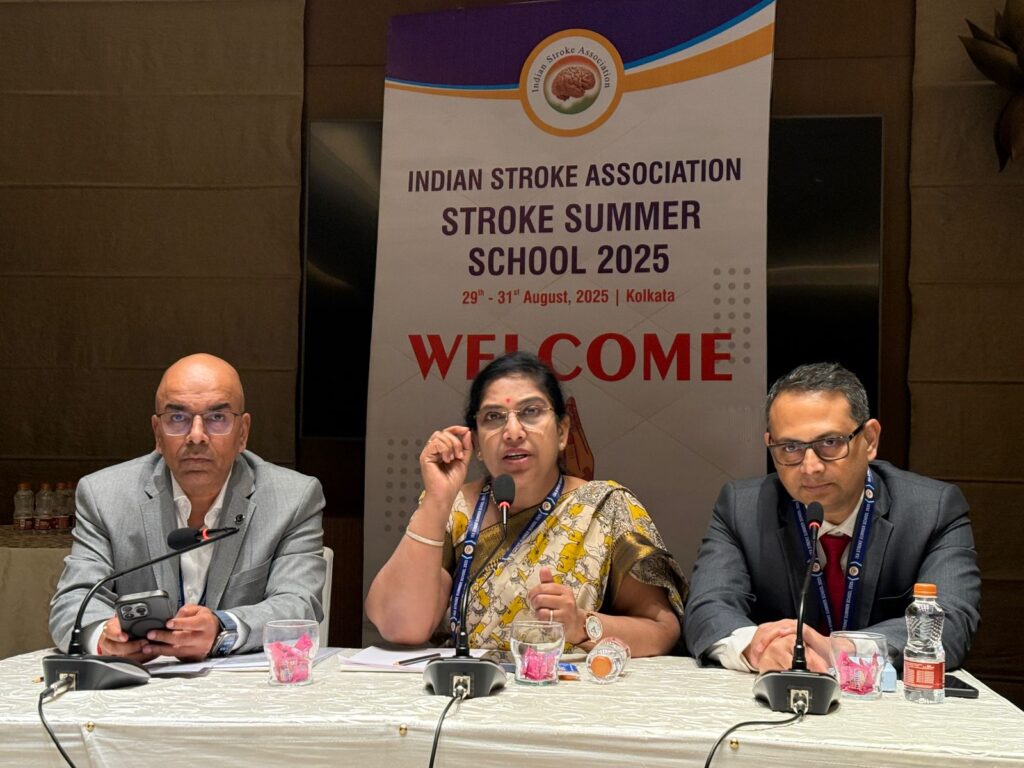
“73% of Indian stroke patients arrive at medical facilities too late to benefit from life-saving treatments,” Dr P Vijaya
“By acting ‘FAST’, we can drastically improve survival rates and outcomes in Kolkata,” Dr Arvind Sharma
Kolkata,29th August 2025: The Indian Stroke Association (ISA) has launched a nationwide initiative, “Brain Stroke – Time to Act, “a stroke awareness campaign aimed at addressing the alarming rise in stroke cases across Kolkata and West Bengal. The state now has the highest Disability Adjusted Life Year (DALY) rate for stroke in India, and experts are raising concerns about this growing health crisis that needs immediate and coordinated action.
Stroke has emerged as one of the leading causes of death and long-term disability in India, with 1.29 million new cases reported in 2019 and nearly 699,000 stroke-related fatalities. Kolkata bears a particularly heavy burden, exacerbated by lifestyle risk factors, low public awareness, and significant delays in accessing stroke-ready hospitals. Alarmingly, 73% of Indian stroke patients arrive at medical facilities too late to benefit from life-saving treatments, with average delays exceeding 11 hours — resulting in the loss of nearly 1.8 million brain cells for every minute that passes.
The “Time to Act” campaign aims to tackle these challenges head-on by enhancing the capacity of general physicians in Kolkata to recognize early signs of stroke, improving referral networks to designated stroke centers, and fostering community awareness through education on the FAST test (Face drooping, Arm weakness, Speech difficulty, Time to hospital). By empowering both healthcare professionals and the public, ISA seeks to reduce response times and ultimately save lives.
Dr. P Vijaya, President, Indian Stroke Association, “Stroke is no longer just an urban health problem—it is now a full-blown public health crisis in cities like Kolkata. West Bengal has the highest stroke DALY rates in the country, and this means our citizens are suffering higher disability and mortality than anywhere else in India. The most tragic part is that stroke is treatable and preventable, yet patients reach hospitals late because families often fail to recognize symptoms or underestimate the urgency. With ‘Time to Act’, we want to empower every citizen to spot the warning signs instantly and seek immediate help. We also want general practitioners, who are often the first contact, to have the training to guide patients correctly. This is a race against time, and every second counts. Kolkata must lead India in making stroke response fast, efficient, and life-saving.”
Dr. Arvind Sharma, Secretary, Indian Stroke Association. “In Kolkata, one of the biggest hurdles we face is the delay in reaching the right hospital. Families often waste precious hours going from one facility to another that is not equipped for stroke management. This single factor costs us more patients than anything else. The ‘Time to Act’ campaign will help strengthen referral systems and train physicians across the city to quickly identify stroke and guide patients directly to specialized centers. Public education is equally vital—people must understand that a drooping face, slurred speech, or sudden weakness in the arms is not something to observe or wait out. It is a medical emergency. By acting fast, we can drastically improve survival rates and outcomes in Kolkata. This campaign will bring together doctors, hospitals, and communities to fight stroke with urgency and coordination.”
Dr Jayanta Roy, Organizing Secretary ISA and Neurologist at Manipal Hospital “Stroke affects people in their most productive years, and this has huge social and economic consequences for families in Kolkata. The average cost of hospitalization for stroke is around ₹40,000, with nearly one-third of households facing catastrophic expenses. Beyond financial stress, untreated or late-treated strokes often leave patients permanently disabled, creating lifelong challenges. The ‘Time to Act’ campaign is about building an ecosystem where public awareness, physician readiness, and hospital response are tightly linked. We are working with local hospitals and doctors in Kolkata to create stroke-ready pathways that ensure every patient gets treatment within the golden window. If we can reduce delays, we can save thousands of lives and prevent lifelong disabilities. Kolkata must recognize stroke as an emergency equal to a heart attack, and this campaign is our call to action.”
As strokes continue to pose a significant threat to public health in West Bengal, the ISA is committed to transforming the landscape of stroke care through this proactive campaign. The association calls on all stakeholders — including healthcare providers, policymakers, and community members — to join together in this vital effort. The Indian Stroke Association is dedicated to reducing the impact of stroke in India through education, advocacy, and collaboration among healthcare professionals and communities.

